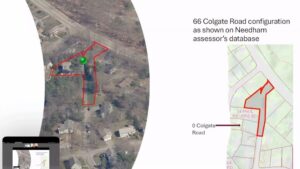April 27, 2023
• An overview of the potential construction project at 1688 Central Avenue and the disagreements about the plan between the town of Needham and the builder.
reported by Yuxiao Yuan
In March, 2022, the Needham Planning Board approved the development of a childcare facility at 1688 Central Avenue, but with several required modifications, including the demolition of an existing barn on the site and a setback that was almost double what the developer proposed. The developer, Needham Enterprises, LLC, quickly filed an appeal to the state Land Court. The case went to trial on April 25th and 26th, and a third trial date has been scheduled for May 18th.
Many of the complaints center around a state law commonly referred to as the Dover Amendment. The Dover Amendment restricts towns and cities from prohibiting or requiring a Special Permit for religious and educational institutions, which effectively exempts such uses from local zoning regulations. However, the law can be ambiguous, because it also states that such lands or structures may be subject to reasonable regulations concerning bulk height setbacks, open space and parking requirements.
The plaintiff claims that the Needham Planning Board’s decision exceeds their authority under the Dover Amendment. Furthermore, the plaintiff challenges specific conditions and modifications imposed in the decision, stating they’re beyond the scope of ‘reasonable regulations’ and would result in excessive compliance costs without generating significant municipal benefits.
Some of the modifications being contested include the demolition of an existing barn, which Needham Enterprises said the Needham Children’s Center plans to use for storage. As such, the barn should be considered a structure for an accessory purpose related to the operation of a childcare facility, and should be protected under the Dover Amendment.
The Planning Board argues that the imposed 120 foot setback requirement would necessitate the demolition of the barn. Needham Enterprises challenges the fairness of this setback requirement, stating the zoning regulation for that area only requires a 35 foot setback, and the increased setback would add $250,000 to the project cost, plus another $224,000 cost for the demolition of the barn, and the construction of a new storage structure. These costs, the plaintiff claims, far outweighs what it considers a negligible municipal benefit. Other contested conditions include a cap on the number of children and staff at the facility, as well as traffic mitigation measures.
Another noteworthy aspect of this case is an active group of abutters of the property. They had filed to intervene as defendants, in order to protect their interests and ensure the Planning Board’s conditions and modifications remain in place.
During the Planning Board’s public hearing process, neighbors expressed significant concerns over various dynamics of the project including traffic and environmental safety. They call for the demolition of the barn, to push the proposed building further back, and to create a longer driveway to prevent the overflow of cars on Central Avenue, which they say is already congested during peak hours.
They also advocated for third party soil testing on the land, due to the recorded existence of abandoned cars, construction materials, and oil drums on the site. The developer agreed to mitigation measures such as adding clean soil, but opposes further testing. Meanwhile, the Planning Board’s decision had required Needham Enterprises to comply with a Needham Board of Health’s assessment of the property, which includes a site examination to determine if soil testing is necessary and recommendations for mitigation if contamination is found. The plaintiff is also challenging the Board of Health’s Authority in this matter, contesting their role in overseeing an assessment. Prior to the start of the Land Court trial, the Planning Board withdrew this condition.
The Planning Board also waived a condition that would have granted them authority to impose additional requirements, should the facility’s traffic impact on the neighborhood be greater than was represented. However, the Board still defends other traffic related conditions, such as requiring police details and the submission of a traffic signal timing plan before a building permit is issued.
In their application for intervention, the neighbors also state that since Needham Enterprises belongs to former Select Board member Matt Borrelli, they “have a healthy skepticism concerning whether their interests will be adequately protected by the Town defendants permitting intervention will address that significant concern.” Ultimately, their motion to intervene was denied by the Court.
We’ll continue to provide updates on this case as more information becomes available during the ongoing trial.
• An overview of the potential construction project at 1688 Central Avenue and the disagreements about the plan between the town of Needham and the builder.





More Stories
ZBA Deliberates Tight Fit on Chestnut Street
Envision Needham Finds Resistance
Needham Open Studios Turns 25